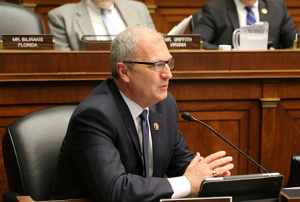 WASHINGTON, D.C. Sen. Cramers Office)[11/14/19] —In association with World Diabetes Day, U.S. Senators Tina Smith (D-Minn.) and Kevin Cramer (R-N.D.) have introduced bipartisan legislation—along with Sens. Tammy Baldwin (D-Wis.), Dick Durbin (D-Ill.), Cindy Hyde-Smith (R-Miss.) and Roger Wicker (R-Miss.)—to create a national study to more fully understand the scope of the insulin affordability crisis in America.
WASHINGTON, D.C. Sen. Cramers Office)[11/14/19] —In association with World Diabetes Day, U.S. Senators Tina Smith (D-Minn.) and Kevin Cramer (R-N.D.) have introduced bipartisan legislation—along with Sens. Tammy Baldwin (D-Wis.), Dick Durbin (D-Ill.), Cindy Hyde-Smith (R-Miss.) and Roger Wicker (R-Miss.)—to create a national study to more fully understand the scope of the insulin affordability crisis in America.
 Earlier this year, Sens. Smith and Cramer introduced bold, bipartisan legislation to bring down the cost of insulin and hold manufactures accountable for excessive increases in the price of the life-sustaining medicine. Now, the senators and a bipartisan group of their Senate colleagues are working to expand the scope of studies on insulin affordability and its impacts on rationing.
Earlier this year, Sens. Smith and Cramer introduced bold, bipartisan legislation to bring down the cost of insulin and hold manufactures accountable for excessive increases in the price of the life-sustaining medicine. Now, the senators and a bipartisan group of their Senate colleagues are working to expand the scope of studies on insulin affordability and its impacts on rationing.
The bipartisan Insulin Affordability Data Collection Act would direct the U.S.
Department of Health and Human Services (HHS) to study rates of diabetic
ketoacidosis—which took the life of Minnesotan Alec Smith two years ago after the high cost of insulin forced him to ration his doses. It would also direct HHS investigators to look into how high insulin prices make it more difficult for people with diabetes to adhere to their insulin prescriptions, and to calculate the amount of money Federal health programs could save if they didn’t have to treat Americans who need additional care because they are unable to afford their proper doses.
“We know that thousands of people are rationing their insulin and that some are paying with their lives like Alec Smith because we’re hearing tragic stories firsthand, and seeing Facebook groups pop up dedicated to helping Americans access insulin. We need to do more than just gathering piecemeal information and have the federal government fully behind addressing this crisis,” said Sen. Smith, a member of the Senate Health Committee. “Our bipartisan bill is about continuing to elevate this issue, fully understanding the scope of what we’re dealing with, and then developing solutions to help the Americans struggling to afford their life-savinginsulin.”
“50,000 North Dakotans need insulin to live, yet we struggle to understand why it is becoming so expensive and what we can do to change that. We need answers,” said Sen. Cramer. “This legislation is an investment in fixing the insulin affordability crisis.”
The Insulin Affordability Data Collection Act would require the HHS Secretary through the Assistant Secretary for Planning and Evaluation (ASPE) to conduct a study that examines the impact of the affordability of insulin on individuals who are insulin-dependent. Specifically, this study will investigate the impact of the affordability of insulin products on:
* Adherence to insulin prescriptions;
* Rates of diabetic ketoacidosis;
* Downstream impacts of insulin adherence (e.g. rates of dialysis treatment and end-stage renal disease);
* Spending by Medicare, Medicaid, and other Federal health programs on acute care episodes that could be averted by adhering to an insulin prescription; and
* Other factors, as appropriate.
This bill would further separate instances of insulin affordability by an
individual’s insurance status. Under this legislation, ASPE would be required to submit this report to Congress within two years of enactment. The bill is supported by the American Diabetes Association (ADA), the Juvenile Diabetes Research Foundation (JDRF), and T1International.












Comments are closed
Sorry, but you cannot leave a comment for this post.